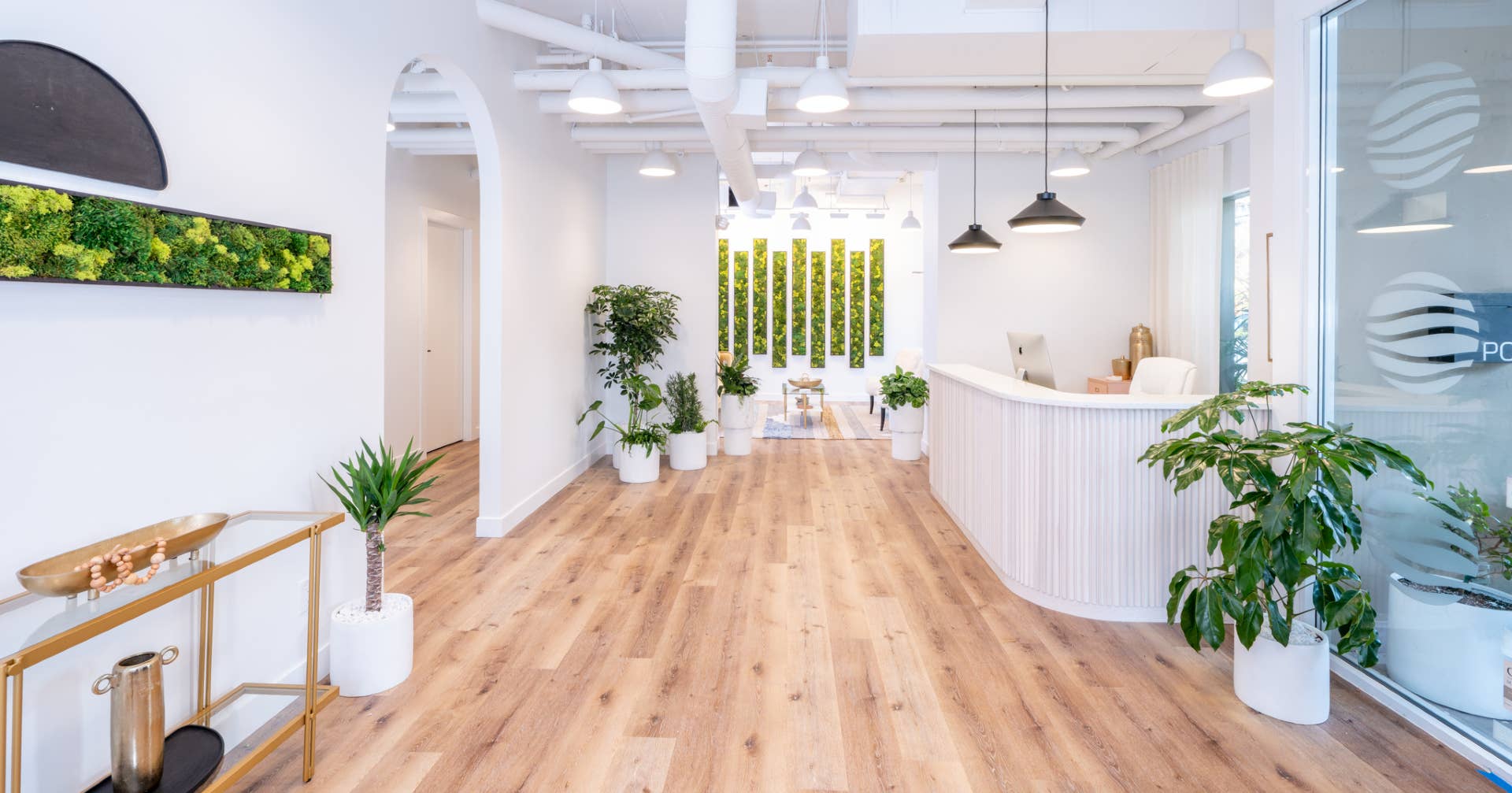
There are plenty of people tripping balls in Vancouver at this very moment. It’s part of the city’s identity.
Some will be in the throes of a recreational drug experiment, others responding to their habitual demands, but another group will be settling down in a new and unique environment with the intention of getting healthier by getting high.
Field Trip is a psychedelic-assisted therapy program that uses drugs like ketamine to perform psychotherapy and treat conditions like depression, PTSD, and more. From its newest clinic in Vancouver, Field Trip’s professionals administer what brand co-founder and former cannabis investor Ronan Levy calls “transformational doses” of ketamine along with cognitive and talk therapy to help patients break through emotional barriers and take meaningful steps toward better mental health.

Levy spoke to us about the Field Trip’s new-age approach to therapy, how the recently opened clinic in Vancouver will help its residents, and what role Canada has in the psychedelic-assisted therapy industry.
How did Field Trip get started?
We incorporated in 2019, but it had been a project that had been in the works for about a year at that point. Myself and the other co-founders at Field Trip were active in the Canadian medical cannabis industry, having scaled the largest network of cannabis-specialized medical clinics in Canada, and selling that to a company called Aurora Cannabis, which we helped grow into one of the largest global producers of cannabis.
What we found in the experience in the cannabis industry, having been fairly cannabis agnostic, was that cannabis was a very potent and powerful medicine for a lot of people. Access to cannabis medicine changed their lives in a very positive way. We saw an opportunity to do something similar with psychedelics, but with the potential impact being what we consider to be much larger. It was a very natural opportunity for us to jump back, especially because there were very few people looking at psychedelics… having seen the whole spectrum of what happened in the cannabis industry, we felt we had a unique perspective to bring to bear on the psychedelic renaissance.
”The biggest misconception is that people think psychedelics are dangerous. I can say with a strong degree of conviction that anything you may have learned about in high school about the risks of psychedelic drugs… they’re severely exaggerated.”
Explain how psychedelic drug therapy works and how it is being used in Canada.
One of the most important things for people to understand is that we’re talking about psychedelic-assisted psychotherapy, which means this isn’t just taking a pill or a drug and hoping things work out. It’s often called experiential medicine… In other words, the preparatory work that you do as well as the actual location where you do have the psychedelic experience, along with the post-experience integration work, which is really just different forms of therapy, have a significant impact on the therapeutic outcome.
It’s very different than medicine as we know it. What it involves is essentially a person with a doctor overseeing and a therapist or two present, taking a psychedelic medicine and putting on noise-cancelling headphones, putting on eye shades and going inwards during the psychedelic experience. What very often happens is people get a new perspective on life. Sometimes they’ll revisit past experiences or past traumas and be able to view them from a different perspective. Sometimes they’ll find a whole level of empathy for someone who’s hurt them in the past. It’s very unique, but what we consistently see is during the psychedelic experience, and for a period thereafter, people are very open to changing their outlook, changing their habits, changing their behaviours in a very healthy way.
The results, which are all through the studies that have come out of the last few years, are just remarkable. We see MDMA-assisted therapy effectively curing people of PTSD. We see psilocybin-assisted therapies providing antidepressant effects for up to five years or longer after a single session. It really is quite remarkable, the impact that psychedelic-assisted therapy has.

This isn’t microdosing, is it?
This is not microdosing, no. There’s a lot of assumption that when we talk about psychedelics, it’s microdosing… this is what we call macro or transformational doses. It’s larger doses of psychedelics done in a controlled but very comfortable environment. If you’ve ever seen any of the images of our clinics, we are really focused on making them feel safe and inviting… warm and inspired by nature, so people feel good being present.
“I know the results we’re seeing are truly remarkable. As far as I’m aware… we’re talking about the most effective depression and anxiety treatments out there, bar none.”
What benefits does this treatment offer that current antidepressants lack?
Antidepressants are really just addressing the symptoms. They try to make you feel better, but with psychedelic-assisted therapy, they make you feel better, but it also helps get at the root causes very often of the depression, of the anxiety, of the PTSD. The reason that seems to work is there seems to be three things that happen during a psychedelic experience. One is you get a massive serotonin rush very quickly so you feel happy, usually within half an hour of taking the ketamine or other psychedelic. Secondly, because it’s a very much inward introspective experience where you do very often revisit past experiences, people do a lot of emotional processing during a psychedelic experience. It’s like what you try to get to through normal cognitive behavioural or talk therapy, but that usually takes years. Whereas people can often get to that same place in a single session with the aid of a psychedelic.
Afterwards, there’s a period of neuro-plasticity. Studies have shown that ketamine and psilocybin cause your brain to grow new neural synopsis, so your brain is actually talking to itself better. It actually starts to repair some of the damages that come from depression. People following a psychedelic experience are much more neuroplastic than they were before the experience… so are able to make lifestyle changes that supports healthier mental health.
Field Trip just opened its third Canadian clinic in Van City. How’s it going at the other Canadian clinics?
The response has been fantastic. Toronto is our oldest and most established clinic. We’re seeing a lot of people. We don’t disclose the numbers publicly, but the clinic is very busy and continues to grow as we continue to show the safety and efficacy of these therapeutic approaches. Certainly there’s a lot of interest on a social and cultural level of psychedelics. We also seem to be winning over the support of the medical community that sees that we’re focused on doing good medicine and creating positive outcomes for our patients.
What is Canada’s role in shaping the psychedelic drug therapy industry?
Canada has quite a significant role in this industry. A lot of the leading psychedelic companies like us were incubated and built in Canada. Also, because of the success of incubating the cannabis industry, a whole lot of investors in Canada were keen to support the psychedelic industry. From an academic perspective, we’re catching up a little bit. American institutions like Johns Hopkins and NYU have been studying psychedelics for a few years now but UofT, Queens, all of the major Canadian institutions are starting to open up centres for psychedelic research.

Do you think Field Trip’s work plays a role in the movement to potentially legalize other drugs in Canada?
Potentially. I think certainly it will work to see access to psychedelics… I know the results we’re seeing are truly remarkable. As far as I’m aware… we’re talking about the most effective depression and anxiety treatments out there, bar none. We’re seeing a majority of our patients go from severe depression scores to mild depression scores almost immediately and those benefits are sustained for up to 120 days or more. As far as I’m aware, there is no depression or anxiety treatment option that comes anywhere close to offering those kinds of results with no severe side effects.
What does this clinic mean to the people of Vancouver and their access to mental health treatment?
I think it’s incredibly important to the people of Vancouver, in fact every jurisdiction in which we opened. By and large, modern psychiatry has not been terribly successful at treating most people’s depression… Here’s a new treatment paradigm that is profoundly effective, remarkably safe, and has low side effects. It’s creating a real option for sustained improvements in our mental and emotional health and wellbeing, and that’s true for Vancouver, it’s true about Toronto, it’s true about everywhere in the world. We’re in the midst of a mental health crisis right now and there aren’t a lot of options and this one is proving itself to be quite remarkable.
What’s the biggest misconception people have about taking psychedelics for health purposes?
The biggest misconception is that people think psychedelics are dangerous. I can say with a strong degree of conviction that anything you may have learned about in high school about the risks of psychedelic drugs… they’re severely exaggerated. What we see, and there’s been a number of studies that have confirmed this is that psychedelic drugs, like ketamine, like psilocybin, like LSD are amongst the safest drugs out there, even compared to pharmaceutical over-the-counter drugs. The risk of addiction with classic psychedelics is virtually non-existent. The risk of overdose in the classic psychedelics is virtually non-existent. The risk of the so-called bad trip, while it’s not non-existent, when done in a therapeutic context… the risk of a bad trip is very low.

